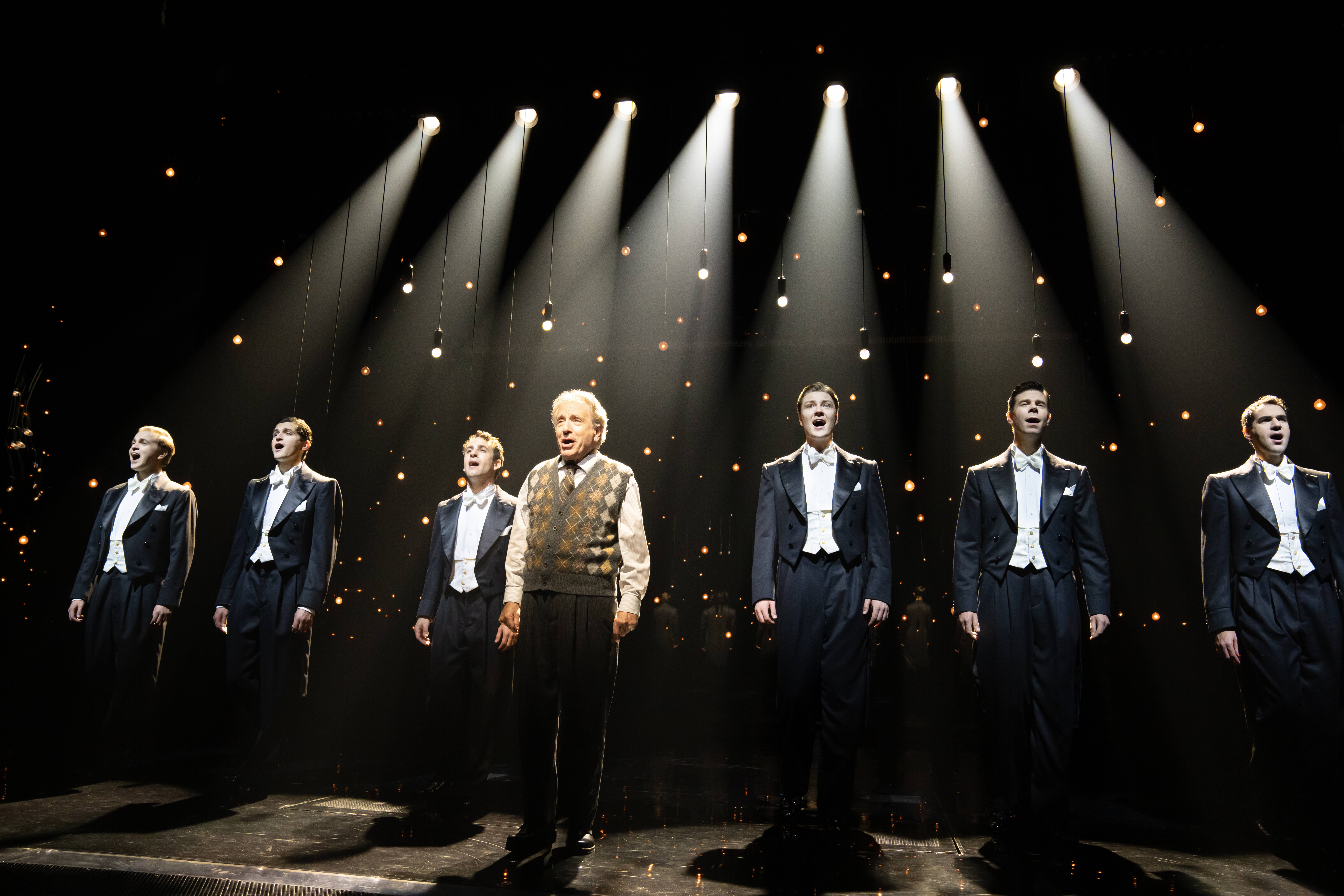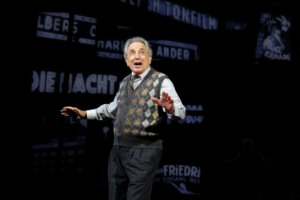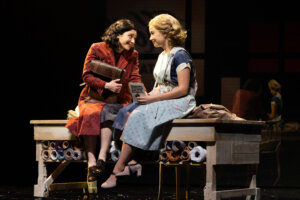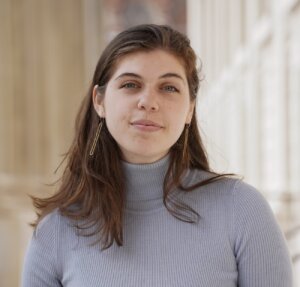In Germany, they were superstars — and then the Nazis came to power
‘Harmony,’ Barry Manilow’s musical about the Comedian Harmonists, is a sometimes-labored labor of love

Steven Telsey, Blake Roman, Danny Kornfeld, Chip Zien, Eric Peters, Sean Bell and Zal Owen in Harmony. Photo by Julieta Cervantes
The Comedian Harmonists are nearing the height of fame. After a smash hit Carnegie Hall debut, the chipper, tuxedo-clad members of the German singing group are celebrating over champagne and deli sandwiches. It’s 1933, and they can hardly believe their luck — adoration from Josephine Baker, a visit from Albert Einstein and an offer to meet with NBC executives who want them to perform in America full-time. Do they take the meeting and move to New York, leaving behind Germany’s rising tide of fascism, or do they return to their country, hoping its new regime will blow over soon?
This is the choice that’s haunted Rabbi — the sole surviving Harmonist and our narrator, played by an indefatigable Chip Zien — for decades. He watches the conversation, echoing lines from the fateful debate in a droning dirge. Harry, the group’s Jewish founder, pushes to take the deal and its promise of a convenient escape from the Nazis. Bobby, one of the other members, resists. In Germany, he argues, the Harmonists are idolized; in America, they’d never be more than silly foreigners. Rabbi tries to shake the memory of his former self into speaking up. But in the midst of the conversation, the Young Rabbi is paralyzed.
Of course, we already know what they’re going to choose. If the show’s Weimar setting isn’t indication enough, the Rabbi’s keening solo lines telegraph the tragedy of the decision, even before its details are fully clear. It’s a wrenching scene. But it’s one of too many in Harmony that expects cathartic payoff from hinting at history and leaving the audience to fill in the rest.
Harmony charts the improbable rise and ultimate disappearance of the Comedian Harmonists, a close harmony sextet — three Jews, three gentiles — who reached international stardom as the Nazis came to power in Germany. Written by longtime collaborators Barry Manilow and Bruce Sussman, Harmony is a musical about memory. Guided by Rabbi, a Tevye-esque narrator riddled with survivor’s guilt, the show seeks to rescue the Harmonists from historical oblivion.

Technically a new musical, the Broadway incarnation of Harmony is only the latest step in its 26-year developmental process. It’s easy to see why the Comedian Harmonists kept Manilow and Sussman captivated enough to tinker with the show for so long. That the ensemble even existed during what Sussman called “the most discordant chapter in human history” is inherently theatrical. The sheer magnitude of their fame is mind-boggling. From 1927 to 1935, the Comedian Harmonists sold millions of records and starred in 13 films. For Manilow and Sussman, Harmony is an opportunity to reintroduce the world to a forgotten global sensation while telling a story about the dangers of antisemitism.
Structurally, Harmony borrows moves from Broadway’s recent crop of biographical jukebox musicals. After a peek at the fateful Carnegie Hall performance, Harmony rewinds back to 1927, when the Comedian Harmonists are just six strangers in Berlin: Harry (Zal Owen), a struggling actor, Lesh (Steven Telsey), a Bulgarian waiter, Chopin (Blake Roman), a brothel pianist, Erich (Eric Peters), an anxious medical student, Bobby (Sean Bell), an operatic bass, and Rabbi (Danny Kornfeld), born Josef Roman Cycowski, a Polish refugee.
With each new arrangement the newly formed ensemble sings, they grow closer to each other — and to the ultimate fame we know they’ll reach. Much like the Four Seasons in Jersey Boys or Carole King in Beautiful, the Comedian Harmonists’ performances work symbiotically with biography, each enriching our understanding of the other.
In the absence of a recognizable catalog of hit songs, Harmony capitalizes on its potential for musical ingenuity. The Comedian Harmonists’ imagined performances are the highlight of the musical. With their intricate arrangements and their singing-and-shtick act, the ensemble has the corny but unflagging charm of a Weimar Era college a cappella group.
Director Warren Carlyle’s playful choreography makes the numbers particularly fun to watch. At one point, the group’s costumes get stolen in an act of antisemitic vandalism right before they’re supposed to perform at a Jewish-owned, high-society Berlin club. The Harmonists go on in their underwear and borrowed jackets, improvising a hilarious bumbling waiter act that ultimately becomes their breakout performance.

Later on, when the Harmonists learn that the Nazis have co-opted their international acclaim to call them German “ambassadors of goodwill,” Carlyle cleverly repurposes the group’s slapstick sensibility into a marionette number that skewers the Reich’s nationalism. Fashioning themselves as literal puppets of German propaganda, the Harmonists dance with their arms dangling from red ribbons, full of vaudeville vitriol that may as well have come out of the Kit Kat Club in Cabaret.
However, when the musical ventures beyond the story of the Harmonists into a larger commentary on politics or antisemitism, it tends to falter. Harmony paints its historical backdrop in broad brushstrokes without taking time to establish the atmosphere of mounting terror that the characters continually reference. When Mary (Sierra Boggess), Rabbi’s woefully underwritten, non-Jewish love interest, warns him of “a world that’s tearing apart” about 20 minutes into the show, it’s the first indication that anything is amiss. As the first act progresses, characters keep paying lip service to a vague, looming evil without ever seeming truly affected by it.
Maybe that’s how it felt in 1927. The show’s Jewish characters are quick to diminish antisemitism, often chillingly so. But from a writing perspective, it’s possible to let danger creep up on unsuspecting characters — take Cabaret or Indecent, for example — in a way that Harmony seems to resist. By the time it goes hard for pathos, Harmony hangs together more due to what the show stands for — as audiences are raw and hyperconscious of recent surges in antisemitism — than the storytelling itself.
Equal parts slapstick and elegy, Harmony charges Zien with the near-impossible task of calibrating the tonal swings. Zien whirls from one scene to the next, popping up in ridiculous disguises for his gimmicky cameos as Richard Strauss, Albert Einstein, and a slew of German club owners. Once he’s back on as Rabbi, it can be hard to settle back into the depths of his remorse. That Zien almost pulls it off is a testament to his status as one of the foremost leading mensches of musical theater.
Once Harmony delves into darker territory, it gives up some of its goofiness for a more consistent tone. While Rabbi and Mary’s love story, as well as that of Chopin and Ruth, a Jewish revolutionary played by a fiery Julie Benko, go underdeveloped in the first act, they take a moving turn in “Where You Go,” a duet between the two women. Mary pledges her unyielding devotion to Rabbi with lyrics inspired by the Bible’s Book of Ruth, while Ruth shames her husband for abandoning her in the hope of saving himself from becoming a Nazi target.
By the time Harmony reaches its conclusion, it achieves what it had been missing earlier on: the exquisite balance of a close harmony arrangement. The Harmonists stand side by side, each shrouded in a spotlight, as the mirrored black set begins to light up with stars. Here, the musical becomes what it should have been all along — mournful and defiant, sweeping and intimate, playful and profound — each aspect in tune with the others.
























